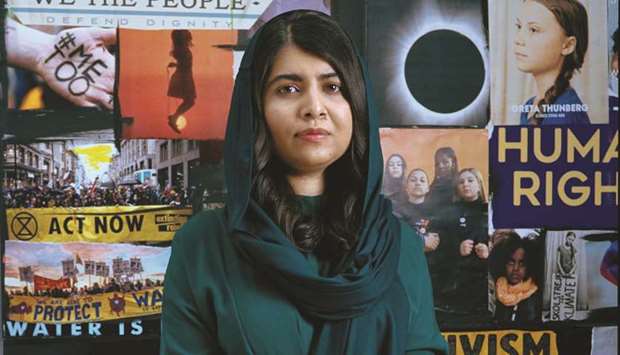“When you educate girls, it adds up to $30 trillion to the world economy. It creates more jobs. It helps us protect our climate. It reduces poverty; it reduces the likelihood of wars in developing countries. So when you look at those advantages, then you say, “We have to invest in girls’ education.”’
— Malala Yousafzai, to Teen Vogue
From becoming ‘The Bravest Girl in The World’— to borrow the cover description of Newsweek magazine — in 2012 and pinned as one of the World’s Most Influential People by the Time Magazine with one cover dedication in 2013 to being declared last week as the ‘Most Famous Teenager in The World’ in the second decade of the 21st century by the United Nations in its ‘Decade in Review’, Malala Yousafzai picks up awards and accolades as if she has a birthright on these.
And yet, the UN pronouncement may just be an understatement: Malala arguably, is already the most famous teenager known to modern history, if not its entirety.
No sooner had this latest and very predictable proclamation been made, the US Department of State swiftly joined the chorus with an emphatic declaration of its own: that the 22-year-old Pakistani education rights activist was “one of the most significant people of the decade”.
“As we approach the end of 2019, we join UN in looking back on most significant people and events of the decade, including Malala, who received the 2014 Nobel Prize in recognition of her struggle against oppression of young people and for the right of all children to education,” Alice Wells, the principal Deputy Assistant Secretary of Bureau of South and Central Asian Affairs, noted.
The UN ‘Decade in Review’ noted: “From a young age, Pakistani student Malala Yousafzai was known for speaking out in favour of the educating girls and highlighting the atrocities of the Taliban. Malala’s activism and profile have only grown since the assassination attempt. She won several high-profile awards, including the 2014 Nobel Peace Prize and became a UN Messenger of Peace in 2017, with a special focus on girls’ education.”
Chances are you’re only going to exhaust superlatives in trying to describe what mettle Malala is made of — and to think she is probably only getting warmed up given that she’s still only on the fringes of completing her university degree means the world has, by all intents and purposes, yet to see her best!
I first floated the idea of a global Malala Fund in 2012 during a conversation with Sheikh Waqqas Akram, Pakistan’s Federal Minister for Education, during the time I edited Pique, a news and current affairs magazine, owned by him. To his credit, he carried it to Asif Ali Zardari, the-then president. In a matter of days, the idea blossomed into a landmark MoU between the Government of Pakistan and Unesco, with Islamabad providing the seed money of $10 million for ‘The Malala Fund for Girl’s Right to Education’ globally. It was signed by Akram and Unesco Director General Irina Bokova at the UN’s headquarters in Paris in December that year.
The event was held in connection with ‘Stand Up for Malala — Stand Up for Girls’ Right to Education’ conference in the French capital where the president made a symbolic reference to the braveheart’s fight for the cause. “Two months ago... a young determined daughter of my country was attacked by the forces of darkness. Malala stood for the right to education, not just for herself but for a bright, progressive future of Pakistan.”
The Malala Fund is now a fully-fledged entity headed by the world’s youngest Nobel laureate herself. A mission related passage from the Fund quotes her as saying thus: “Now, I am studying Philosophy, Politics and Economics at the University of Oxford. And every day I fight to ensure all girls receive 12 years of free, safe, quality education.
“I travel to many countries to meet girls fighting poverty, wars, child marriage and gender discrimination to go to school. Malala Fund is working so that their stories, like mine, can be heard around the world.
“We invest in developing country educators and activists, like my father, through Malala Fund’s Gulmakai Network. And we hold leaders accountable for their promises to girls.
“With more than 130 million girls out of school today, there is more work to be done. I hope you will join my fight for education and equality. Together, we can create a world where all girls can learn and lead”.
Two years ago, whilst speaking at the Canadian parliament following Prime Minister Justin Trudeau’s welcoming speech after being bestowed the honorary citizenship of the country, Malala took the opportunity to remind the world of what was possible with an action plan for girls’ education whose core points still resonate:
l If all girls went to school for 12 years, low and middle income countries could add $92bn a year to their economies ($30 trillion over all, according to World Bank).
l Educated girls are less likely to marry young or contract HIV — and more likely to have healthy, educated children.
l The Brookings Institution calls secondary schooling for girls the most cost-effective and best investment against climate change.
l When a country gives all its children secondary education, they cut their risk of war in half.
The world is clearly better off with Malala leading the cause. Her ‘stateswoman’ like stature is evident in the latest Teen Vogue interview, where she talks on a whole gamut of current issues, especially with regard to youth activism on a global scale, which she argues, is now assuming a game-changing proportion.
The US publication chose her to be on the cover of its last issue of the decade and disclosed that it had decided to “reflect” the last 10 years with the education activist.
“Saying her life has been incredible feels understated; there is a quality to her that is beyond what words can describe, a profile in courage unmatched. As we put together our final package for the decade rooted in the brilliant, world-changing demands of teens across the world, we knew there was no better person to sit down and reflect on this wild decade with,” Teen Vogue suggested — in stating the obvious.
* The writer is Features Editor. He tweets @kaamyabi

STANDING TALL: Malala Yousafzai standing in front of the Teen Vogue cover board.

